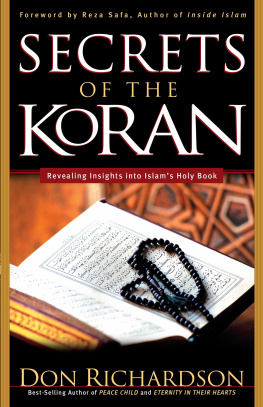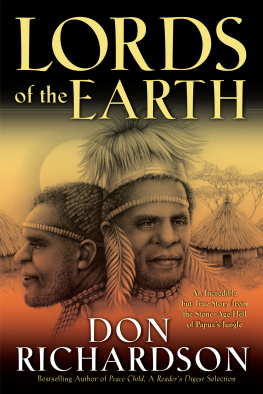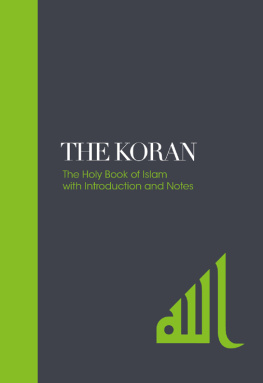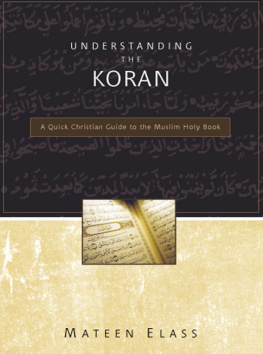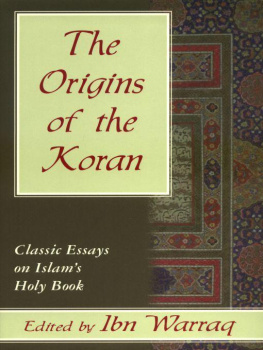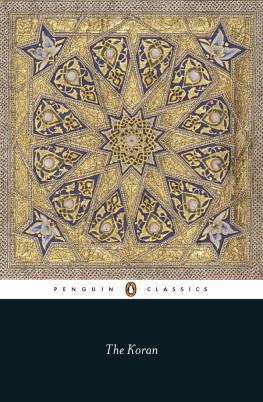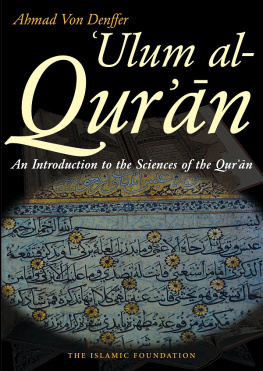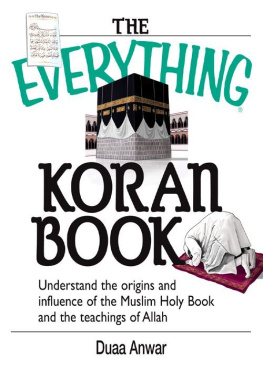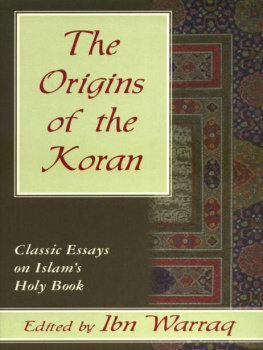Don Richardson - Secrets of the Koran: Revealing Insights into Islams Holy Book
Here you can read online Don Richardson - Secrets of the Koran: Revealing Insights into Islams Holy Book full text of the book (entire story) in english for free. Download pdf and epub, get meaning, cover and reviews about this ebook. year: 2008, publisher: Baker Publishing Group, genre: Religion. Description of the work, (preface) as well as reviews are available. Best literature library LitArk.com created for fans of good reading and offers a wide selection of genres:
Romance novel
Science fiction
Adventure
Detective
Science
History
Home and family
Prose
Art
Politics
Computer
Non-fiction
Religion
Business
Children
Humor
Choose a favorite category and find really read worthwhile books. Enjoy immersion in the world of imagination, feel the emotions of the characters or learn something new for yourself, make an fascinating discovery.
- Book:Secrets of the Koran: Revealing Insights into Islams Holy Book
- Author:
- Publisher:Baker Publishing Group
- Genre:
- Year:2008
- Rating:5 / 5
- Favourites:Add to favourites
- Your mark:
- 100
- 1
- 2
- 3
- 4
- 5
Secrets of the Koran: Revealing Insights into Islams Holy Book: summary, description and annotation
We offer to read an annotation, description, summary or preface (depends on what the author of the book "Secrets of the Koran: Revealing Insights into Islams Holy Book" wrote himself). If you haven't found the necessary information about the book — write in the comments, we will try to find it.
Secrets of the Koran: Revealing Insights into Islams Holy Book — read online for free the complete book (whole text) full work
Below is the text of the book, divided by pages. System saving the place of the last page read, allows you to conveniently read the book "Secrets of the Koran: Revealing Insights into Islams Holy Book" online for free, without having to search again every time where you left off. Put a bookmark, and you can go to the page where you finished reading at any time.
Font size:
Interval:
Bookmark:
SECRETS OF THE
KORAN
If one ignores the central message of this book, one does so to one's own peril. Some have said ignorance is bliss. They are wrong. Ignorance can cost one dearly. And this applies to the topic of Islam.
Whenever one discusses Islam, two choices are left: (1) speak the truth and make some people very upset, or (2) sugarcoat the facts and be quite popular. Don Richardson chose the former.
He is a truth speaker. This will not make him popular, but it will make him historically correct on the issues. I have only two more words to say about Don's book: read it.
DR. JIM GARLOW
AUTHOR, A CHRISTIAN'S RESPONSE TO ISLAM
Secrets of the Koran, written by one of the foremost missionary statesmen of our day, is a timely book for all those who love the truth. The same Jesus who had to go through Samaria (John 4:4) went out of His way to minister to one woman (love) and then told her, when she confidently referred Him to their place of worship, You Samaritans worship what you do not know (v. 22) (truth). Don Richardson's book will serve to educate Western Christians and leaders about the truth concerning the Islamic religion while maintaining the imperative of reaching the Muslim masses with the gospel.
WALEED NASSAR
PRESIDENT, GREAT COMMISSION MINISTRIES INTERNATIONAL WWW.GCMINTERNATIONAL.ORG
There is little doubt that a major obstacle to reaching unsaved people in the world today is the dark spiritual power behind Islam named Allah. The first step toward binding this strong man is to understand what we are dealing with under the surface. I know of no better place to start than Don Richardson's powerful book Secrets of the Koran.
C. PETER WAGNER
CHANCELLOR, WAGNER LEADERSHIP INSTITUTE
2003 Don Richardson
Published by Bethany House Publishers
11400 Hampshire Avenue South
Bloomington, Minnesota 55438
www.bethanyhouse.com
Bethany House Publishers is a division of
Baker Publishing Group, Grand Rapids, Michigan.
www.bakerpublishinggroup.com
Bethany House Publishers edition published 2014
ISBN 978-1-4412-6697-2
Previously published by Regal Books
Ebook edition originally created 2010
All rights reserved. No part of this publication may be reproduced, stored in a retrieval system, or transmitted in any form or by any meansfor example, electronic, photocopy, recordingwithout the prior written permission of the publisher. The only exception is brief quotations in printed reviews.
Library of Congress Cataloging-in-Publication Data is on file at the Library of Congress, Washington, DC.
All Scripture quotations are taken from the Holy Bible, New International Version. Copyright 1973, 1978, 1984 by International Bible Society. Used by permission of Zondervan Publishing House. All rights reserved.
All verses from the Koran are taken from N. J. Dawood's translation unless otherwise noted. Copyright 1999 by Penguin Putnam, New York, NY. Used by permission.
Other versions of the Koran used are:
A. AliTranslated by Ahmed Ali. The Koran. Princeton, NJ: Princeton University Press, 2001.
M. M. AliTranslated by Maulana Muhammad Ali. The Koran. Columbus, OH: Lahore, Inc., USA, 1998.
ArberryTranslated by A. J. Arberry. The Koran. New York: Simon and Schuster, 1996.
M. Z. KhanTranslated by Muhammad Zafulla Khan. The Quran. New York: Olive Branch Press, 1997.
RodwellTranslated by J. M. Rodwell. The Koran. New York: Random House, 1993.
ShakirTranslated by M. H. Shakir. The Koran. Elmhurst, NY: Tahrike Tarsile Qur'ab, Inc., 2001.
Foreword
By Reza F. Safa
Introduction
From Peace Child to the Koran
Chapter One
A Book of Peace?
Chapter Two
The Wolf in the Fold
Chapter Three
Violent Verses, Violent Deeds
Chapter Four
Critiquing the Koran
Chapter Five
Polygamy and Islam's Prophet
Chapter Six
How Muslims Try to Defend the Koran
Chapter Seven
Non-Muslim Attempts to Defend the Koran
Chapter Eight
Old Testament Morals and the Koran
Chapter Nine
New Testament Morals and the Koran
Chapter Ten
A Warring Prophet's Supremacist Legacy
Chapter Eleven
Islam's Plan for World Domination
Chapter Twelve
Islam's Penetration of Western Culture
Chapter Thirteen
A Twenty-First Century Plague of Locusts?
Chapter Fourteen
Europe: An Auto-Genociding Continent
Chapter Fifteen
Louis Farrakhan, Islam and Slavery
Chapter Sixteen
Reviewing Militant Islam Reaches America
Chapter Seventeen
What Should We Do?
Epilogue
X-Raying the Secrets
Appendix A
Christianity's Age-Long Exclusivist/Inclusivist Controversy
Appendix B
The Koran's 109 War Verses
On September 11, 2001, the world took a major turn. In the spiritual realm, a demonic force made a new declaration of its existence, purpose and resolve. In the natural realm, the free world faced a new challenge threatening its very survival. This so-called faceless enemy is not a philosophy, such as communism, but one that has a fearful theological ideology that has penetrated, to one degree or another, the hearts of 1.2 billion people around the world.
In the political arena there are always compromises because of the nature of the system. Truth can be a relative issue depending upon whom it will benefit. For example, after September 11, politicians and news reporters declared that Islam is a peaceful religion and that groups such as al-Qaeda are just the fanatical offbeat type that do not represent true Islam. Few ask upon what basis their assessment is made. Are politicians and reporters relying upon their personal knowledge of the teaching and the traditions of Mohammed, the most holy prophet of Islam? Or are they relying upon the teaching of the most holy script of Islam, the Koran? Or the 1,400-year history of Islam?
In the United States, our judicial system is based upon facts, not hearsay, emotions, feelings or think sos! In other words, we as jury members in the court of public opinioncannot base our assessment of the intentions of a religion with which we are unfamiliar upon the opinions of our political analysts. We must have facts because the lives of millions of people depend upon our assessment.
If Islam is a peaceful religion, then why did Mohammed engage in 47 battles? Why, in every campaign the Muslim armies have fought throughout history, have they slaughtered men, women and children who did not bow their knees to the lordship of Islam? The reign of terror of men such as Saddam, Khomeini, Ghadafi, Idi Amin and many other Muslim dictators are modern examples. If Islam is peaceful, why are there so many verses in the Koran about killing the infidels and those who resist Islam? If Islam is peaceful, why isn't there even one Muslim country that will allow freedom of religion and speech? Not one! If Islam is peaceful, who is imparting this awful violence to hundreds of Islamic groups throughout the world who kill innocent people in the name of Allah?
The undeniable truth is recorded in the history of what Mohammed did in his lifetime and what, as laid out in the Koran, the god of Islam requires of his followers. The Islam that Mohammed proclaimed in the seventh century is something for all of us to take a closer look at because that version of Islam is more violent and has more resolve than many might think.
Seventh-century Islamic despotism continued until the fall of the Ottoman Empire, then lay relatively dormant for a season. But since the statehood of Israel was established in 1948, the Islam of Mohammed of the seventh century has been on the rise. It showed its capability and its nature with the revolution of the Ayatollah Khomeini in 1978 in Iran. And ever since, men such as Ghadafi and Osama bin Laden have been blowing the dust off the sword of a forceful world-invading religionthis true Islam is on the rise. The question is how do we deal with it?
Font size:
Interval:
Bookmark:
Similar books «Secrets of the Koran: Revealing Insights into Islams Holy Book»
Look at similar books to Secrets of the Koran: Revealing Insights into Islams Holy Book. We have selected literature similar in name and meaning in the hope of providing readers with more options to find new, interesting, not yet read works.
Discussion, reviews of the book Secrets of the Koran: Revealing Insights into Islams Holy Book and just readers' own opinions. Leave your comments, write what you think about the work, its meaning or the main characters. Specify what exactly you liked and what you didn't like, and why you think so.

